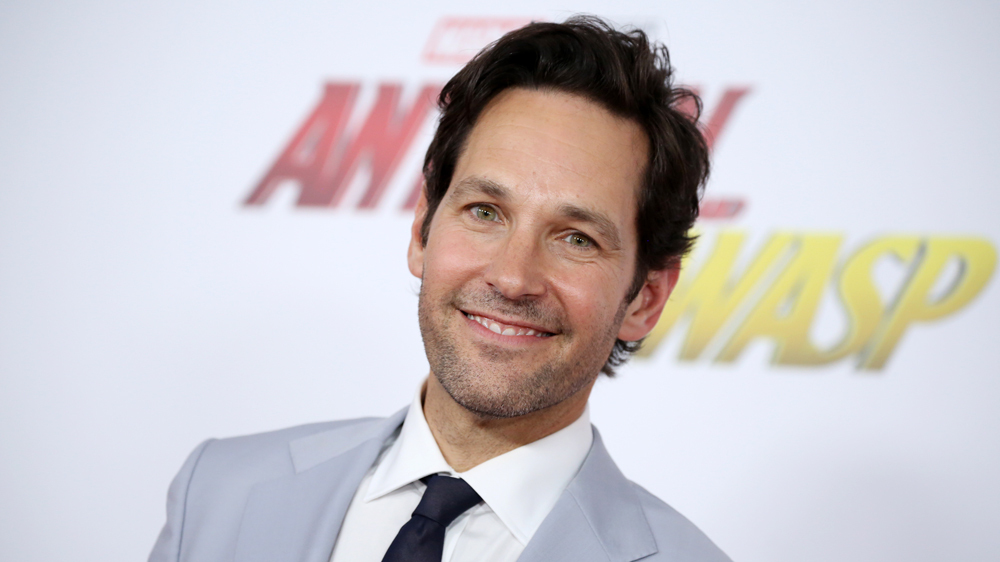Search Results for: The Days Before
The deadline for January Logline Showdown is THIS THURSDAY at 10pm! So if you have a logline you want to enter, follow this link and it will give you instructions on how to submit. This is the first Logline Showdown of the year so it’s a big one. Best five loglines will be posted Friday for the weekend competition.
Genre: Horror
Premise: A dysfunctional family’s weekend is interrupted when a strange man shows up at their door claiming to know the wife from many years ago.
About: Christopher Landon is one of the biggest horror directors in town. He was unfortunately part of that Scream 7 disaster where the entire movie imploded within seven days (lead actress getting canceled, the industry’s hottest young actress, Jenna Ortega, not counting Sydney Sweeney, also dropping out). Maybe there’s a movie idea there. A horror movie is a week away from shooting and the actors start getting killed one by one. Somebody write it. Anyway, Landon quickly moved onto this project which is none other than a… SHORT STORY! So, once again, we’ve got a big short story sale. If you’ve got Amazon Prime, you can read “Big Bad” for free over on their site.
Writer: Chandler Baker
Details: 62 pages
Yes, I know this is a site about screenplays thank you very much. But how can you expect me to ignore the hottest trend in story sales: SHORT STORIES. I just go where the money is, baby. And, as I’ve mentioned before, short stories aren’t that different than screenplays. In fact, today’s story is probably the same number of words as a 90 page screenplay. You’re just telling the story in a more descriptive medium.
Also, it’s been a long time since we’ve had a great werewolf movie. There was that one awesome werewolf script from last year. But I’m still looking for a werewolf movie that gave me the same feels as when I first saw The Lost Boys. Can Big Bad give me that oh-so-good feeling I’ve been waiting for? Time to bust out the dog treats and find out!
Sam and Rachel are the unhappy parents of girls Odie and June. The family lives in Eugene, Oregon and, right from the start, we sense this is a majorly dysfunctional crew. Rachel is a renowned academic with a good professorial job but her job is the only thing good in her life.
Sam was also once a renowned academic – that’s how they met – but these days he’s more of a recluse who writes in spits and spurts. We’re not sure why yet. But after switching POVs from Rachel to Sam, we learn that Sam despises something deep within his wife, something that, it appears, has infected their marriage since the beginning.
The town is dealing with a recent problem – landslides from the nearby mountains have taken down some of the town’s infrastructure. This has brought more animals into the area. And the predators have followed. The main predators that everyone is worried about are wolves.
A sick Rachel comes home from work and immediately starts arguing with Sam. The daughters watch. Sam sends them to bed. Then Sam takes Rachel downstairs into the basement. He comes back up without her. But before Sam can go to bed, there’s a knock on the door. It’s some guy claiming to be an old friend of Rachel’s. He wants to see her. Sam tells the guy to beat it but it takes a while to send him away.
Sam senses something is off, heads downstairs, and that’s when we realize Rachel is a werewolf. This is where she’s chained down when she turns. But the chains have been shed and there’s no sign of Rachel. This is VERY BAD NEWS. Sam hurries upstairs, ushers the girls into the attic, and goes down to find Rachel.
Instead, he finds the man from earlier, who reveals his true purpose for being here. He’s a werewolf hunter. And he’s not leaving until Rachel is dead. Heck, Sam can even help him if he wants. A scuffle ensues and Sam is able to kill the man. But that still leaves one x-factor floating around: Werewolf Rachel. Will he have to kill his wife? And is that something he’s wanted to do all along?
I don’t know what I was expecting here. But I definitely wasn’t expecting something this dark. This story is f&%$ing dark dude. DARK. Right from the start, these two don’t like each other. It’s not a casual dislike. It’s a deep dislike. So you’re trying to figure out why that is.
Baker, who’s a really good writer, baits you with a few misdirects, making you think Sam is the werewolf. So when it turns out to be Rachel, we’re surprised. As he’s gradually revealing all the toys in the story, he’s keeping you primed with this mysterious stranger who keeps showing up wanting to know where Rachel is.
Even the scenes that have the potential to be boring, like when the girls are stuck up in the attic, contain entertainment value. They start looking through old pictures kept in boxes and find out they had a brother. Where is that brother now? It doesn’t take long to add 2 + 2. I told you. This story is DARK.
I must reiterate how valuable it is when the writer can stay ahead of the reader. It’s even better when the reader THINKS he’s ahead of the writer only to be proven wrong. Which is what happens here. I thought I knew how this was going to end. I was wrong. And it really solidified the writer’s commitment to writing a TRUTHFUL DARK tale. He was never going to “Hollywood” this up. Maybe Landon and the studio change that in the movie but they shouldn’t. The ending is perfect.
Strangely, you know what this story reminded me of? Anatomy of a Fall. For those who haven’t seen it, the story is built around this marriage that completely fell apart. Crumbled on every level because the husband and wife hated each other. This is the werewolf version of that movie.
I wouldn’t be surprised if Landon saw Anatomy of the Fall, was then pitched this book by coincidence, and he realized that he could capture that same dysfunction and collapse of a family, in the form of a werewolf movie.
For those still struggling to come up with their own short story, one of the ways to write these is the way Big Bad was written, which is create ONE BIG SCENE. The family is at the house. The wife is turning into a werewolf so she needs to be tied up. A mysterious dude shows up at their door. There’s your scene. Have fun. And that’s exactly what Baker does. She milks every crevice out of that scenario. I would go so far as to say nobody could’ve written it better.
Also, a big reason why this worked – and this is something you can do a lot more in short stories than you can in scripts – is it gave the reader more detail about the world and more detail about the past. You can go into how Rachel and Sam met. How they were once happy. The specifics by which they were happy (meeting at school – were both hotshot academics). And really detail how they got to this point.
But it’s not just providing the facts. It’s providing the facts in the most dramatically advantageous way possible. Give us a little bit here, but not enough to form the entire picture. Just enough to make us curious and to get us to start forming that picture in our head. Then wait until 4 pages later to give us a little more information.
For example, we show the kids looking through the pictures. Then we see some little boy with dad. Who’s this boy? Don’t give us the answer yet. Cut back to Sam looking for Rachel. Four pages later, show the girls discussing this boy, trying to figure who he is. Only then do we start realizing – this was their brother and Rachel killed him. THAT’S why their marriage is so bad. It’s pretty hard to be happy when mommy murdered your son.
Another thing that stood out in the writing was that everybody was DOING SOMETHING when the story began. Bad writers start their characters’ lives as soon as they write “FADE IN.” Good writers know exactly what those characters have been doing for the past year, for the past month, for the past week, yesterday. (This is why I had you guys doing all that pre-script character work this week!!!)
That may not seem important. But when you read this story, you learn exactly why it *is* important. Since Baker knew exactly what was going on in Rachel and Sam’s lives, she could place them in situations where they’re DOING THINGS when we meet them. Things that matter. It makes SUCH A DIFFERENCE.
Someone needs to change the cover of this book. Cause this cover makes this look like it’s going to be a YA book. But this is one of the darkest stories I’ve read in a year. Wow.
[ ] What the hell did I just read?
[ ] wasn’t for me
[ ] worth the read
[x] impressive
[ ] genius
What I learned: Usually when I write these “What I Learneds,” I’m regurgitating things I already know. They’re important things – things that help screenwriters. But I’m no longer always learning something new from a script. This story was different. I genuinely learned something. Create a disturbance at the beginning of your story. A town that is going about its daily business is boring. A town that is cleaning up after a devastating landslide – that’s more interesting. It gives your location and your story an immediate energy cause everybody’s reacting to what just happened. I’m definitely filing this one away. Create a recent disturbance to your story’s location to start your story off with an extra spark of energy.
Genre: Comedy
Premise: A couple on the brink of divorce sets off on a romantic getaway to save their marriage, but when they find that they have inexplicably traveled back in time, they decide to team up to stop their younger selves from ever getting married.
About: This script finished Top 20 on last year’s Black List. The writers of the script have been writing together for over a decade. While they have made some shorts and a low-budget feature, this is their first big screenwriting break.
Writers: Mario Kyprianou & Becky Leigh
Details: 111 pages
A little time travel always gives me a case of the cosmic goosebumps. That and a fresh-off-the-grill double-double from In-And-Out. If only those bastards delivered.
It’s rainy here in LA. I’ve got that milky-gray light bleeding through my windows – the kind that makes you want to read. Which is perfect for a guy who runs a website about… reading. :)
Married couple Jon and Ellie Landau have just turned 50 and are heading back to the place where Jon proposed to Ellie – Hawaii. Back then, when they were in their 20s, they were madly in love. But these days, Jon seems to be more turned on by his latest phone alert than he is his wife’s ass.
Ellie feels this, which is why she suggested this vacation. It’s the last chance to rekindle their love. And they get things started right away! Ellie suggests they do a repeat of their initiation into the Mile High Club, only to learn that pulling off sex in the airplane lavatory isn’t as easy, or fun, as it was when you were a horny 23 year old. Let’s just say this attempt ends with the Sky Marshall banging down the door.
Once at the Hawaii airport, the two walk by a play where the head actress, an old woman, appears to put some sort of spell on them. The next thing they know, everybody’s smoking cigarettes and their phones don’t work. They shrug it off and head to the hotel, which looks exactly like it did 30 years ago.
But it isn’t until they spot their younger selves that reality sets in – they’ve been transported back 30 years to the exact week when their young selves came. After a very difficult conversation, Jon and Ellie realize that neither of them are happy and that they probably would’ve had much better lives had they never gotten married to each other.
So they bestow it upon themselves to stop Young Jon from proposing to Young Ellie. And, while they’re at it, they decide to incept their younger selves with a dose of advice. For Young Jon, Jon will make sure he pitches his Amazon-like idea (before there was Amazon) to Future Fest. And for Young Ellie, Ellie will get her to pursue her writing career that she abandoned. To achieve this, they’ll have to befriend their younger selves. Along the way, however, they just might realize that they’re happier than they think.
I like this idea.
It’s like that George Clooney Julia Roberts thing from 2022 but more clever. In that movie, they were trying to stop their kids from getting married. Here, they’re trying to stop themselves. It goes to show that every idea has numerous iterations you can choose from and it’s worth it to explore those options before committing to your original one.
But how about the execution?
When I read a comedy, I need to start laughing immediately. I don’t know if I’ve read a comedy where I didn’t laugh at all in the first 10 pages and then I was laughing a lot from that point on. That’s why it’s so easy to judge comedy scripts quickly. You know if you’re not laughing during those first couple of scenes, the script is a dud.
And I laughed a lot in this opening scene. The writers take a well-known scenario – the mile-high club – and put it under the comedic microscope. The mile-high club sounds good in theory. But how does it work in practice? What happens if the bathroom smells from the last person in there? What about if there’s pee all over the place? How do you situate yourself? Especially if you’re older and less flexible?
And then there’s the comedic contrast – the scene is comparing the past to the present. They did this before, when they were in their 20s. But when you’re in your 20s, you’re not as aware. You don’t think about sanitary issues. You just go in there and do it. But after growing up and understanding how things work, you’re aware of EVERY little potential ickiness. That contrast is what makes the scene funny.
So the script grabbed me right away. And while the laughs don’t come as frequently as in that first scene, there are still some solid LOL moments going forward.
But here’s the thing…
The writers make the mistake of allowing their plot to take precedence over their comedy. I only realized this in the last couple of years: People come to a genre to get THAT GENRE. They come to horror to be scared. They come to action movies to see action. And they come to comedy to laugh. If you’re prioritizing anything else in the script over the thing that the reader showed up for, the reader’s going to be disappointed.
I just talked about this with a writer in a recent script consultation. He’d written a comedy and he had this big giant twist at the end that he really wanted to make work. And I asked him, “When’s the last time you went to a comedy and left excited about a twist ending?” It’s never happened. When you go to a comedy, all you care about is whether you laugh or not.
So with The Getaway, the writers inject two major plotlines – 1) stop Young Jon from proposing to Young Ellie and 2) have Jon get his younger self to create a great pitch at Future Fest so that he becomes rich and successful. That may sound like a good idea since it gives your characters something to do, which keeps them active.
But if the machinations of that plotline are too elaborate, then you’re spending more time explaining the storyline than you are writing funny scenes. You could feel that here. We’re so focused on getting Jon to get his younger self to like him so he can get him to pitch his Amazon idea that finding funny scenes gets left behind.
I’m starting to think you need to approach comedy differently than any other genre. Coming up with a plot that’s amazing, even coming up with amazing character arcs, isn’t as important as writing funny scenes. So when you come up with a comedy concept, brainstorm 50 funny set-piece scenes that best take advantage of your concept (yes, I said “50”), settle on the top 5, and build your story around those five set-pieces (as opposed to outlining a plot and trying to find comedic scenes along the way).
I know this is the better route because the funniest scene in this script is the first scene. And a big reason for that is that the plot hadn’t kicked in yet. So the writers could focus on writing the funniest scene rather than finding a funny scene within their plot.
Once the plot began to control them, then they had to write super-goofy scenes that weren’t that funny and didn’t make sense (riding in a helicopter and getting barfed on by someone from a separate helicopter). That’s what happens when you’re constrained by plot.
I’m going to finish this off by saying one more thing. In certain screenplays, there’s an opportunity to add a work subplot. Like here, we get this whole work subplot where Jon is going to help Young Jon pitch his Amazon idea to Future Fest. This subplot is the definition of an unneeded subplot. How do I know this? Cause I could ask 100 people who’ve read this script if they cared whether Young Jon succeeded with his pitch or not and all 100 would say no.
Again, THAT’S NOT WHY WE’RE COMING TO THIS MOVIE. We don’t care if Jon nails the pitch. You only want to include a work subplot if it has significant importance to the screenplay working. If you removed the subplot in The Getaway, nothing changes. That’s how you know it’s not needed.
The prototypical way to pull a work subplot off is Pretty Woman. They tell you just enough about the work subplot so that the m movie makes sense – it’s the whole reason Richard Gere is in town for a week and why he needs to hire a prostitute – and not one minute more. It’s there to help things make sense and that’s it.
Whereas, here, it’s impeding the actual fun of the script. We’re here to see if these two break their younger selves up. We’re not here to see if they do better at work. That’s nowhere on the poster. I want every screenwriter to internalize this. Only include the story beats that you promised us. Don’t give us ones we don’t care about. And ESPECIALLY don’t give us subplots that force you to make your screenplay more boring.
This script started out strong. These writers have comedic chops. But they focused too much on plotting and, in the process, lost too many opportunities to be funny. I do like that the writers are using the story to try and say something about the choices we make in life and how they can lead us down completely different paths. But that should not have been the priority. The priority should’ve been the comedy.
[ ] What the hell did I just read?
[x] wasn’t for me
[ ] worth the read
[ ] impressive
[ ] genius
What I learned: Relationship scripts work best when the writers lean into the TRUTH. Whenever you give us moments that feel truthful and representative of what happens in real life, we will connect with it. There’s a brilliant little moment early in the script where Jon and Ellie are excited for getting upgraded to the Penthouse suite. They can’t wait to get some dinner at the fancy restaurant downstairs. We then hard cut to them at the dinner table in silence. Why? Because they have nothing to talk about. Why do they have nothing to talk about? Because they’ve spent the last 30 years together! This was the most truthful moment in the whole movie. It captured marriage in just 10 seconds. And it did so because it leaned into truth. Leaning into truth ALWAYS MAKES YOUR SCRIPTS BETTER.
The short story sale only took 45 years to happen
Genre: Dystopian/Sci-Fi Adjacent
Premise: 100 teen boys participate in an annual event that forces them to do a death walk until there is only one left.
About: Okay, I’m cheating a little. This isn’t technically a short story. But it’s a short story in Stephen King Language, as the man is known for writing 700 page novels. Technically, he would call this a novella. King also wrote this under his fake author doppelgänger, which King invented once he became too popular and figured everyone was buying his books regardless of whether they were good or not. He wanted to challenge himself and see if he still had it as an author, which is why he invented Bachman. The Long Walk, which is 45 years old at this point, was purchased by Lionsgate and will have Hunger Games director Francis Lawrence direct. The film was almost made twice before, once by George A. Romero and once by Frank Darabont.
Writer: Richard Bachman (Stephen King)
Details: (1979) A little under 250 pages, hardcover.
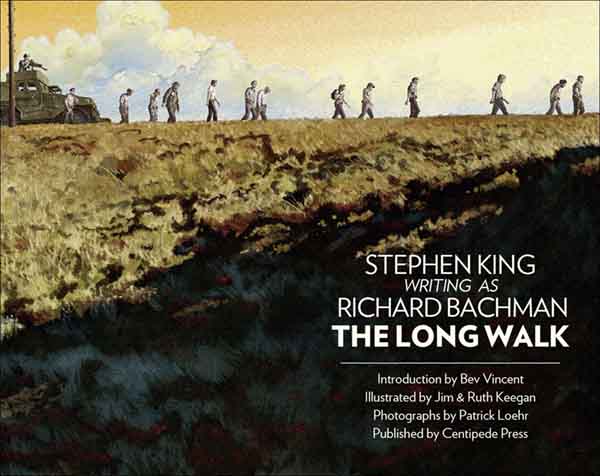
I’ve decided that I’m going to do a Short Story Showdown at some point this year. I’m not sure when but it will probably be June or July. So start coming up with that short story concept because we can’t deny what the current trend is, which is short stories, short stories, short stories.
If I could give you one piece of short story advice, come up with a big idea. Think “high concept” even more so than you would a script. Cause a lot of these short stories are a quarter the size of a screenplay. So you don’t really have time to put your characters through some complex arc. It’s more about a sexy idea that’s going to generate interest in potential moviegoers.
The Long Walk is a great example of this. It’s all about the idea. Let’s see if it offers us anything else.
16 year-old Ray Garraty was chosen to be one of the contestants for The Long Walk, a yearly competition where thousands of boys enter their names in a hat for a chance to compete for the grand prize – all the money you need for the rest of your life. Only 100 names are chosen and Ray is one.
No sooner do we meet Ray than the walk begins! The rules are simple. You have to keep up a pace of 4 miles per hour. If you don’t, you get a warning. You get three warnings total. The fourth time, they shoot you. As in, THEY KILL YOU. The last remaining person to be walking is the winner.
Ray immediately teams up with a guy named Peter McVries. Whereas Ray is more of a wholesome chap, Peter’s got an edge to him. It feels like he’s hiding a few secrets inside that noggin of his. But Peter seems to be as supportive of Ray as he is himself. The two lean on each other a lot as the first contestants “buy their ticket” (Long Walk code for “shot dead”).
The story doesn’t deviate much. It leans into the long grueling competition of trying to keep walking when you’re tired, when you get a Charlie horse, when you get a cramp, when you’re bored, when you get blisters on top of your blisters, when your shoes come apart, when your body wants to give in. Many a contestant tries to game the system – run into the crowd to escape, thinking the guards won’t possibly shoot at them. But it never works. The crowd wants to see them die so they push them back to allow the guards a clear shot.
15 miles turns into 20. 20 to 50. 50 to 100. Days go by. 5 of them in all. Somehow, some way, Ray keeps going. At a certain point, it’s just Peter and Ray. (Spoiler) But then Peter can’t go on. He’s too exhausted. Which means Ray is going to win. When Peter is shot, that’s exactly what we think. It’s over. But did Peter lose count? Is there another player he must outlast? Or is that player death himself? Is Peter even in the game anymore?
A few of you are probably asking, “Why’d you pick this to read, Carson?” Here’s why. The Hollywood system is so obsessed with the word “no,” due to the fact that it keeps them from having to make a decision, that when they finally say “Yes” to something, it’s a really big deal. It’s so hard for any executive to say yes because they know, once they do, that project could go horribly bad and, if it does, they’ll be fired. It’s probably the best view into an exec’s mind you’re going to get. Committing to anything is so daunting that there HAS TO BE SOMETHING SPECIAL about that project for them to say yes to it.
But if I’m being honest with you, the real reason I chose to read this as opposed to a script that sold or a script that made the Black List, is that I knew it was going to be entertaining. King has his storytelling faults. But his stories always place “entertaining the reader” first. So I know I’m going to enjoy the experience of reading The Long Walk.
I’ve read too many scripts to know that most writers don’t prioritize entertainment when writing a story. They’re writing for their own egotistical reasons. Or they’re trying to write something that’s taken seriously. Or they think that readers will stay with them for thirty pages of setup to get to the good stuff.
All King thinks about is the reader. That’s why he’s the most well-known living author. If every writer could take in just a quarter of that desire that King has to entertain people, their scripts and stories would be so much better.
And that’s exactly what happened. I was entertained from the jump.
I mean, do you know how quickly we get to the walk here? Within the first ONE PERCENT of the story! That’s how determined King is to entertain. He knows why you bought this book and he’s going to deliver on that promise. This is especially important with short stories. Not only do you need a high concept premise. But you need to get into that premise faster than when you’re writing a script.
What’s interesting here is that the entertainment comes at us in an unorthodox way. I’m not surprised at all that George Romero was once attached to this because the deaths here aren’t fast and furious. They work more like zombie deaths, where they come slowly. The people involved realize minutes, sometimes hours, ahead of time, that their death is coming. This makes the deaths more realistic, intense, and emotional.
When one kid tells Ray that he’s got a cramp and he’s looking to Ray for help, Ray looks back at him like, “I can’t do anything for you.” And the realization this kid has that nobody can help him is devastating.
That’s the majority of the book. King introduces us to kids along the way, tells us just enough about them to get us to care, then kills them off later on.
Another thing I liked about this story was the rules.
As with any sci-fi (or sci-fi adjacent) story, you have to have rules. Where so many writers screw up is they make their rules too complicated. Or they have too many of them. Or both. Note how simple the rules are here. You have to keep up a 4mph pace. You get three warnings. On the fourth, they shoot you. That’s it! For some reason, writers think that they’re not getting enough out of their story if the rules are simple. So they invent all these complicated rules. But the opposite is true. When the reader easily understands the rules, all they have to do is enjoy the story. They don’t have to constantly rack their brain to remember a + z = q.
Another great lesson you can take from this story is how impossible King makes it feel. With every script you write, you need to make the goal as impossible-feeling as you can AS EARLY as you can.
Ray is not dead tired on mile 97 when there are 3 kids left. He’s dead tired on mile 20 with 97 kids left. That’s how to make the reader wonder, “How in the world is he going to last?” And if the reader is asking that question, I guarantee they’ll keep turning the pages. It’s only when there are no questions left to answer, or the answers to the questions are obvious, that the reader stops reading.
The story does have narrative limitations. It starts to get monotonous since there’s only one thing to do. And I thought that King could’ve done more with the Ray and Peter friendship. If he could’ve made us love this friendship, like he did the kids in Stand By Me, their final walk together would’ve been a lot more emotional. And then, the ending needs work. You could tell King didn’t know how to end this. Luckily, there are options here, starting with strengthening that friendship.
Overall, a solid story that should be a good, but not great, movie.
[ ] What the hell did I just read?
[ ] wasn’t for me
[xx] worth the read
[ ] impressive
[ ] genius
What I learned: A sound strategy for screenwriting is to see what the hot new trend is and go back through your finished scripts to see if you have anything similar. You can do this starting from scratch (writing a brand new script) as well. But trends are finicky. They can last a year. They can last five years. So any sort of head start is preferable. There’s no doubt in my mind that this story got purchased due to the success of Squid Game. And, to be fair, it’s been a while since that show came out. Regardless of that, the quicker you can move on a trend, the better. So if you have that old abandoned spec that is similar to the hot new thing, dust it off, give it a quick rewrite, and get it out there!
I tell you how The Beekeeper script sold for a million bucks and share with you some screenwriting lessons from Anatomy of a Fall and Self-Reliance
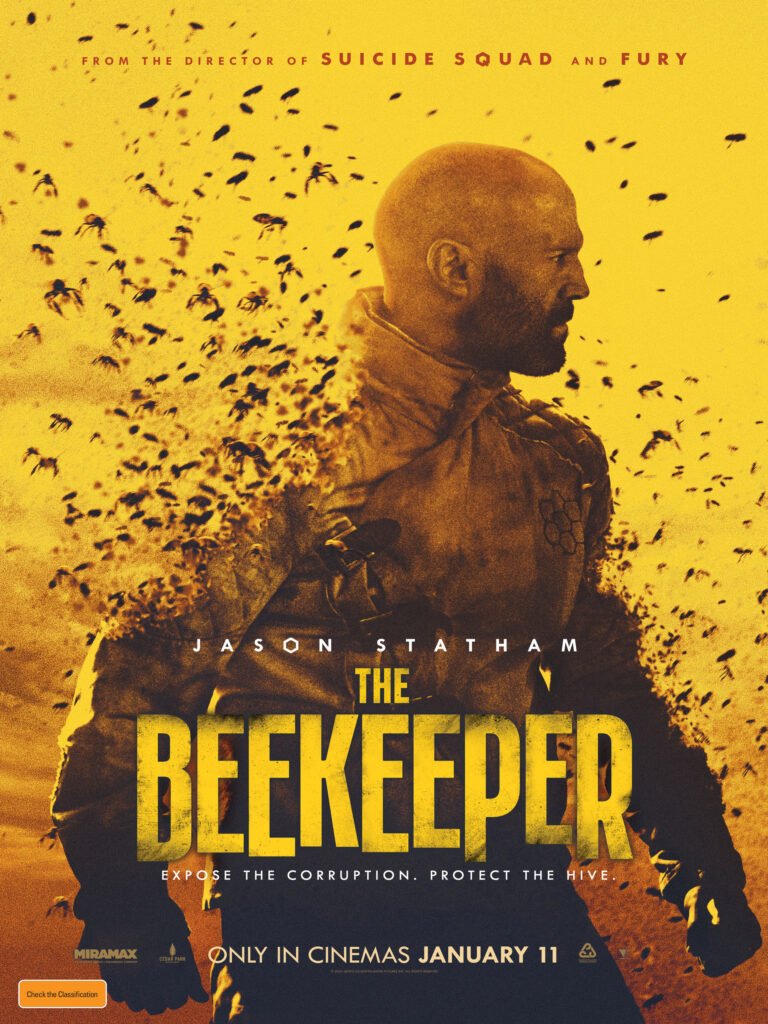
January is always a funky month in the box office schedule. It used to be a dumping ground for studio movies that tested terribly but, these days, if you have a marketable movie, fun things can happen. Which is why Mean Girls pulled in north of 30 million bucks this weekend.
A lot has been made of the fact that Mean Girls hid that it was a musical in order to get more people to show up. This strategy has always baffled me (they did it with Wonka as well). If you know people don’t want to show up to a musical, why did you make a musical?
Cause neither of these films needed to be musicals. They each would’ve worked as regular movies. I’m guessing in the case of Wonka, it was to get Timothee Chalamet on board. These vain actors are all about proving how versatile they are. So if Chalamet is offered ten common roles and one musical, he’s going to take the musical. Cause that’s the one where he gets to prove the most. So maybe they did it to get him and then began their crusade to convince the rest of the world that they weren’t actually making a musical.
Whatever decisions led to keeping Mean Girls’ dirty little secret, I’m not sure it mattered. Mean Girls is a classic film. It’s still referenced today. So it did well for the same reasons that most franchises do well these days – nostalgia.
The movie I was keeping closer tabs on was The Beekeeper. I reviewed the script last year and loved it. Kurt Wimmer is one of my favorite spec script writers. There are few screenwriters who know how to make readers turn the page better than him.
His process is a strange one, too. He writes 12 screenplays a year – a new one every month. And then he just keeps his ear to the ground on what people are looking for. If an opportunity comes up (his agent calls and says Gerard Butler really wants to make a helicopter film), he goes through his giant script database to see if he’s got a helicopter script.
The way this project came together – and I know this cause Kurt told me – is that Kurt had a previous relationship with Jason Statham and Statham had just gone through a major upheaval with his representation. He fired his agents and managers. He then called Kurt and said, “Do you got anything for me?” And Kurt had just finished The Beekeeper. Statham loved the sound of it and he was in.
I think the reason it’s doing solid business and that audiences are really liking it is that there’s nothing else out there like it. It’s kinda weird. It’s kinda silly. Yet it has this hardcore action component. It really is its own thing. Which is something I tell all writers – you have to give us a script that differentiates itself from all the other scripts out there. You can’t expect to write Type 1 concepts and get people excited.
Will Beekeeper become a franchise? If so, it has to pull off what John Wick did. Not a ton of people saw John Wick when it first hit theaters. It took off once it came to digital. That told Lionsgate that there was a big audience for the film, which is why they gambled on a bigger budget sequel. When that did well, each successive film budget got higher.
Cause, right now, The Beekeeper can’t compete on an action level with John Wick 4 or Fast and Furious. It doesn’t have the budget. To get that budget, it needs to perform like gangbusters on streaming. That’s probably the template for anyone wanting to build a franchise from scratch these days. It’s not like The Matrix anymore, where you become a franchise the first movie out. You have to build that audience.
I watched a couple of movies this past week, each of which provided screenplay lessons. The first was Anatomy of a Fall, which is a big awards contender. It’s a French movie that follows this married writer who lives with her husband and blind 12 year old son out in the middle of nowhere.
One day the husband’s dead body ends up in front of the house and it’s unclear whether he accidentally fell from the third floor, purposely jumped to commit suicide, or if his wife, our protagonist, attacked and pushed him off. The majority of the movie takes place in a courtroom where the prosecution tries to prove that she murdered her husband.

First of all, the movie’s fun to watch if only to see how the French court system works. It’s so bizarre and different from American court. It’s a lot more theatrical. You can’t believe that that’s how they really try people for murder.
But, beyond that, the movie is a failure (spoilers follow) due to the fact that they never tell you if she murdered him or not. If you’re going to build your entire premise around the question of did a woman kill or not kill her husband, then NOT GIVING US THAT ANSWER is cowardly.
You’re a coward because you were afraid to make a creative choice. I say this not just because of this movie. But because I see it all the time in screenwriting. A writer builds their entire story around a question, then doesn’t give the reader the answer. In their minds, they are being artistically courageous. Only hacky mainstream Hollywood movies answer questions, they reason. “Real” movies, movies with “artistic merit,” are vague and ambiguous. They allow the audience to come to their own conclusions.
Bulls#$%.
You can tell yourself that. But what you really are is spineless. You see, if you fashion yourself an “artist,” you can’t give your script a Hollywood ending. So you can’t give us the mainstream answer, which is that she didn’t murder her husband.
However, since there are only two options here – she did or didn’t do it – you know that the jaded readers will find the other avenue just as cliche. In other words, if you say that she did it, the “cool kids” in the audience will roll their eyes and say, “Of course she did. We saw that coming from a mile away.”
So your solution is to not give us any answer. “You figure it out,” you say.
Let me make something clear to you. If you are offloading the work that YOU SHOULD BE DOING and making the reader do it instead, you’re not being an artist. You’re just afraid to make a choice.
Is making a choice going to make some people unhappy? Of course. But it’s your job as a writer to write with conviction. Stand behind your choices. Write towards something you want to say. Don’t make the audience do the work for you. That’s lame. Because I know this writer knows if she killed her husband. They were just afraid to share that truth. That’s unacceptable.
Another movie I watched this weekend was a film on Hulu called Self-Reliance. Jake Johnson writes and stars in the movie. I’m a Johnson fan because he’s from Chicago (where I’m from) and there’s not one person I know who better looks and acts like a Chicagoan than Jake Johnson. Sometimes, when he speaks, I feel like I’m listening to myself.
The movie follows a guy with a boring job whose 15-year girlfriend broke up with him so he moves back in with his mother. Then, one day, he’s approached by some people who tell him he’s been chosen for a game. The game is a dark web game where he’ll be remotely recorded and people will try and kill him. If he can survive for 30 days without getting killed, he wins a million dollars.
He decides to join the game because of a small loophole in the rules which states that he can’t be killed as long as he’s with somebody. So he figures, I’ll just keep someone next to me the whole 30 days. As it turns out, being physically within someone’s presence 24 hours a day isn’t as easy as it seems.

A few people e-mailed me after my Concept Post on Thursday and asked, “Is it possible to write a low-budget Type 2 concept?” And the answer is, “Yes.” To quote the late great Montell Jordan: “This is how you do it.” This story is built around a game where you’re trying to avoid assassins for a dark web audience. It doesn’t get any more high concept than that.
Unfortunately, this script is an example of what happens when a newbie writer makes a movie. I know that Johnson has writing credits on a few other films but, from what I understand, those were improvised acting movies where the director gave him a writing credit cause he was making up his dialogue as he went along. Here, he’s actually writing a script.
Where newbies often go astray is that their tone bounces around too much. Here, we have this dark heavy game. But then later, when he teams up with another female player, it turns into a lighthearted romantic comedy. You can’t do that in screenwriting. You gotta pick a lane.
Actually, let me rephrase that. Anything’s possible. As I pointed out earlier, The Beekeeper is equal parts intense and silly. But The Beekeeper was written by a 30 year professional screenwriter who’s literally written 100+ screenplays. You have to go through the trenches to know how to balance tone. If you’re new to this, trying to fit wildly different tones into the same script is the equivalent of riding a roller coaster standing up. Loopdie-loop? More like loopdie-dead.
In this case, had Jake committed to that darker tone, it would’ve taken a 6 out of 10 movie, which is how IMDB currently rates it, to an 8 out of 10. Cause I was into the movie when it was dark and unpredictable. The second it became a rom-com, my interest nose-dived. So it’s not just about matching tone. It’s about sticking to the story you promised the reader you would tell.
Then again, this is that weird movie month where up is down and north is south. So it might be worth checking out if you liked the sound of the premise. I STILL haven’t watched Holdovers. That’s going to be my next one. Oh, and Sisu. A few people have told me that one was good.
Two quick reminders before I go.
CHOOSE THE CONCEPT FOR THE SCRIPT YOU’RE GOING TO WRITE BEFORE THURSDAY. We’re going to start the outlining process.
Also, this is another reminder that January Logline Showdown is January 25th. So get those loglines to me before then!
 Did Mario make the list???
Did Mario make the list???
I’ve got some devastating news for y’all.
This might be THE LAST POST OF THE YEAR.
Then again, maybe not. Maybe I get nostalgic and post something tomorrow. Or the next day. You never know with the wackadoodle running this site.
But I will say this. I’m excited to share my top 10 movies of the year. This year started out shaky but made a noble comeback towards the end.
I don’t want this to only be a thread discussing my favorite movies. I want you guys to discuss your favorite movies as well. I’m particularly interested in movies that weren’t on anybody’s radar. Collectively, we can come up with a handful of gems that we all get to watch over the holidays.
Before we get to the best movies of the year, I must mention the movies that fell outside my top 10. The biggest one is Oppenheimer. I thought it was an okay movie that fell apart when it rambled on for an extra 45 minutes after the bombing. Also, for a movie that spent its entire running time focusing on one person, I was shocked at just how little I knew about Oppenheimer when it was all over. With that said, I liked it better than Killers of the Flower Moon, which had an even weaker narrative structure.
Both Across The Spider-verse and Guardians 3 were solid superhero movies. But I had enough issues with each that they landed outside my Top 10. Then there was another solid movie in John Wick 4. But the director needs to learn that action movies are slim, not bulky. A 110 minute version of John Wick 4 could’ve been awesome.
The Equalizer 3 was sneaky good and almost made my Top 10. I haven’t seen Napoleon. Air was pretty good but I was let down by Ben Affleck’s rushed direction. The script was much better. The Creator looked beautiful but Gareth Edwards desperately needs a writer. The film’s narrative and point were too muddled. I haven’t seen The Holdovers, Godzilla Minus One, or Saltburn, all of which, I’m assuming, would have had a shot at my Top 10.
Okay, are we ready for the DEFINITIVE Top 10 Movies list of the year? Let’s get to it.
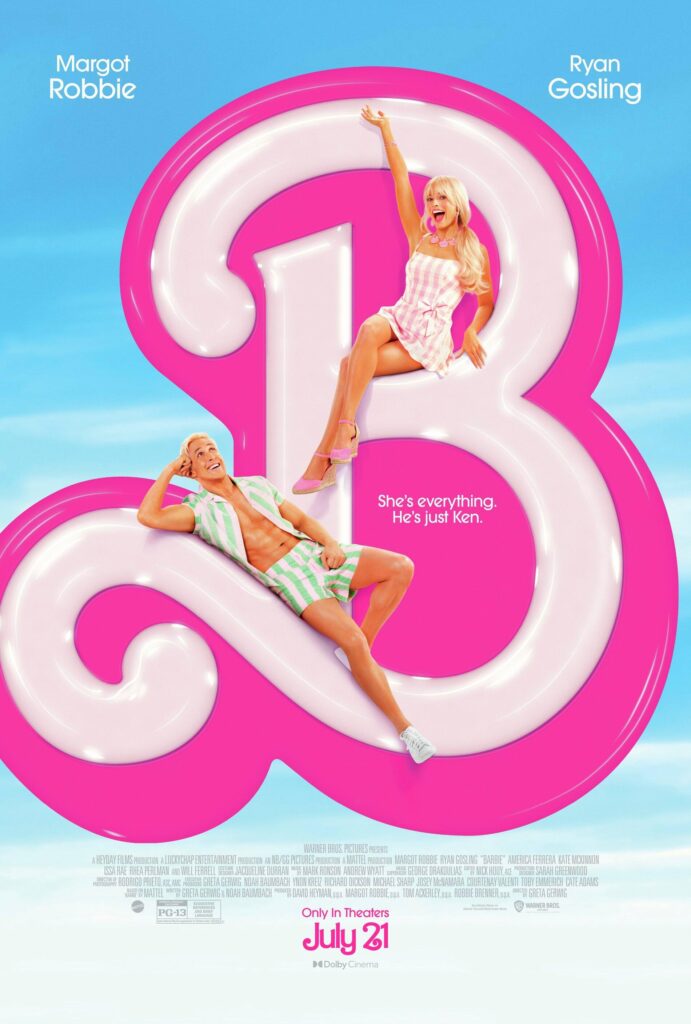
NUMBER 10 – BARBIE
This is a shocker to some of you. It’s a shocker to me too. But the more I thought about it, the more I realized you can’t tell the story of 2023 Cinema without talking about Barbie. But it’s more than that. While I didn’t agree with the message of the film, I admire what the writers did from a screenwriting perspective. This may be the best example of writers infusing genuine depth into a studio film in over a decade. It is NOT EASY to do what Gerwig and Baumbach did. They made a mainstream movie with indie sensibilities and it resulted in the movie making MORE money than it would’ve if they went 100% mainstream. The character of Ken still resonates in me today. Gosling is iconic in the role. And you know what I think the secret sauce was here? This is the first time in forever that a studio made a big IP movie without a franchise in mind. Gerwig and Robbie just wanted to make a singular great film. Because they didn’t have to leave any open threads, they ensured that the movie stood on its own.

NUMBER 9 – THE KILLER
How bout that for a contrast in entries? The most feminist film of the year back to back with the most masculine film of the year. If that doesn’t prove that I have eclectic taste, I don’t know what does. The Killer got some pushback when it came out and I’m still trying to figure out why. It was an awesome movie. Not only did it deconstruct the John Wick formula. But it was buoyed by the amazing direction of Fincher (that fight set piece was INSANE!). It felt nastier, grittier, and more realistic, than all these slick over-produced John Wick clones. And, as I covered in my review, I loved the way they sequenced out the scenes into mini-movies, all with their own beginning, middle, and end. I’m guessing people may have been expecting something more complex from Fincher and were therefore disappointed in the simplicity of The Killer. But I thought it was great.

NUMBER 8 – THE FLASH
I loooooooooved this movie. To me, this film is a prime example of media manipulation of the audience’s expectations. The media went above and beyond to make this movie feel “less than,” and, as a result, people went in with their 2-liter bottles of haterade and came out urinating those thoughts all over the internet. But if you distance yourself from the narrative and see this movie for what it is, it’s a really good movie. The main character is likable. The concept (two Flashes working together) is fun. Bringing in Batman added a whole other element of excitement into the mix. Literally the only thing wrong with the movie is that Warner Brothers stopped putting money into it when the PR went south. So you have these weird unfinished effects scenes. But that just goes to show how good the movie was – that it could withstand that. This is the best superhero movie of the year and it’s not even close.
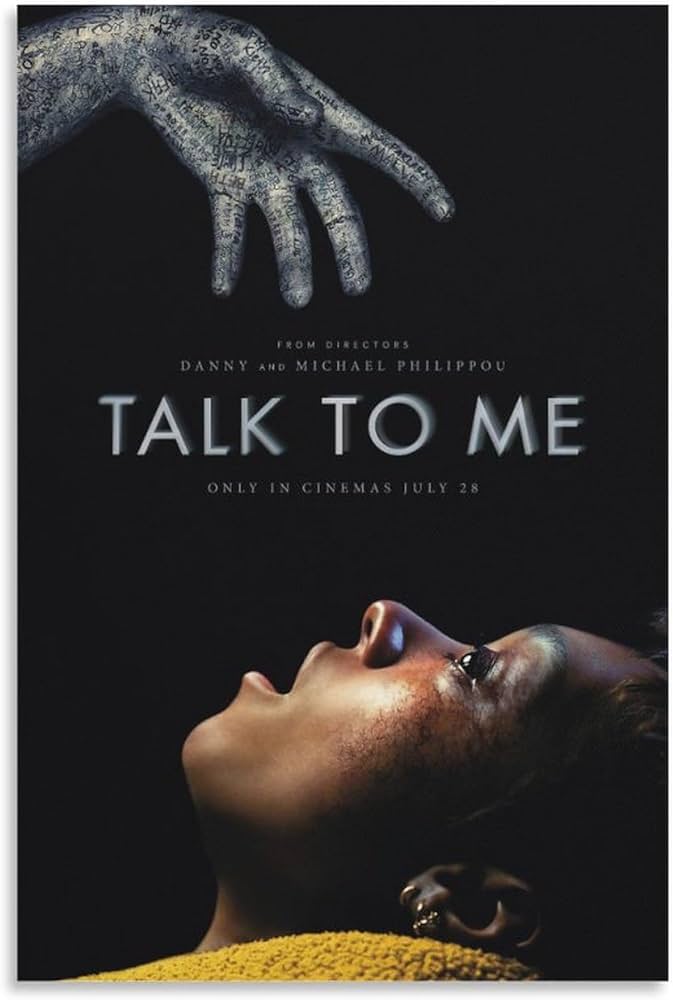
NUMBER 7 – TALK TO ME
I think this movie taught me the secret to horror. It contains 3 steps. One – simple premise. In this case, a cursed hand that makes you see dead people. Two – make it scary. It’s obvious but make sure the scares are legitimate scares. I read too many horror scripts where the scares are unoriginal and tame. You gotta push the envelope and be legitimately scary. And three, put an actor or actress in the lead role who we love. The actress in this movie was amazing. She’s going to be a gigantic star. Something about her eyes pulled you in and didn’t let you go for the entire running time. The script has a few issues. The narrative isn’t the tightest. But it makes up for it in the direction and acting. It’s a really fun little movie.

NUMBER 6 – POOR THINGS
What surprised me the most about Poor Things was that I thought it was going to be a directing showcase only. That there would be no script to speak of. I was dead wrong. Like I pointed out in my review, the movie follows The Hero’s Journey to the T. It is as screenplay-ish a movie as there is on this list. It’s also a movie that takes a lot of chances and challenges some of the narratives in Hollywood right now, which I found refreshing. It’s almost like the anti-Barbie. Just like Barbie, it has an awesome male character, this time in Duncan, who may be the funniest character in any movie this year. Whenever he had one of his temper-tantrums, I couldn’t stop laughing. The subject matter is uncomfortable if you really start to think about it. But that’s the genius of this movie. You can watch it with your brain or you can watch it with your brain turned off and it works either way. Also, Emma Stone is amazing in the film. I can’t see any scenario where she doesn’t win the Oscar.

NUMBER 5 – DUMB MONEY
If you just want to have a good time with a movie, throw Dumb Money in. It’s such an unexpectedly fun flick. What’s weird about it is, I don’t even know if I’d call it a comedy. It may have invented a new genre. Cause it’s more “fun” than “funny.” So maybe it’s a funedy? Can we create that genre right now here on Scriptshadow? If it starts getting used everywhere, make sure to timestamp this. The movie is most effective at getting you invested emotionally because we can’t stand the fact that these rich corporations are laughing as they steal money from the regular folk. And when the regular folk finally figure out a way to win the game, the corporations change the rules. It’s infuriating. The Robin Hood CEO guy alone deserves to be publicly shamed for an entire year with what he did. If you get me to invest emotionally AND entertain me? I’m the happiest moviegoer in the world. Dumb Money is the biggest shocker on this list. I wasn’t expecting anything from it and I loved it.

NUMBER 4 – MISSING
For some reason, I’m obsessed with these screen-capture movies — movies that take place all on a computer screen. But the reason this one elevates itself above all the others is that it utilizes all the latest apps and technology you can use straight for your computer. For example, when June is trying to figure out where her mom is in Mexico, she hires a task-rabbit person through an app to go looking for her, giving her boots on the ground. This is something that just wasn’t available five years ago. I love when screenwriters do this – utilize new technology to create new story avenues. Cause otherwise, you have to compete with hundreds of years of ideas. The script also has one heck of a twist that I was shocked I didn’t see coming. But, in retrospect, I know why. It’s because the unique point of view (a computer screen) makes the viewer think in ways they wouldn’t normally think. Which allows you, as the writer, to use that against them. This is such an enjoyable little movie. I can’t recommend it enough.
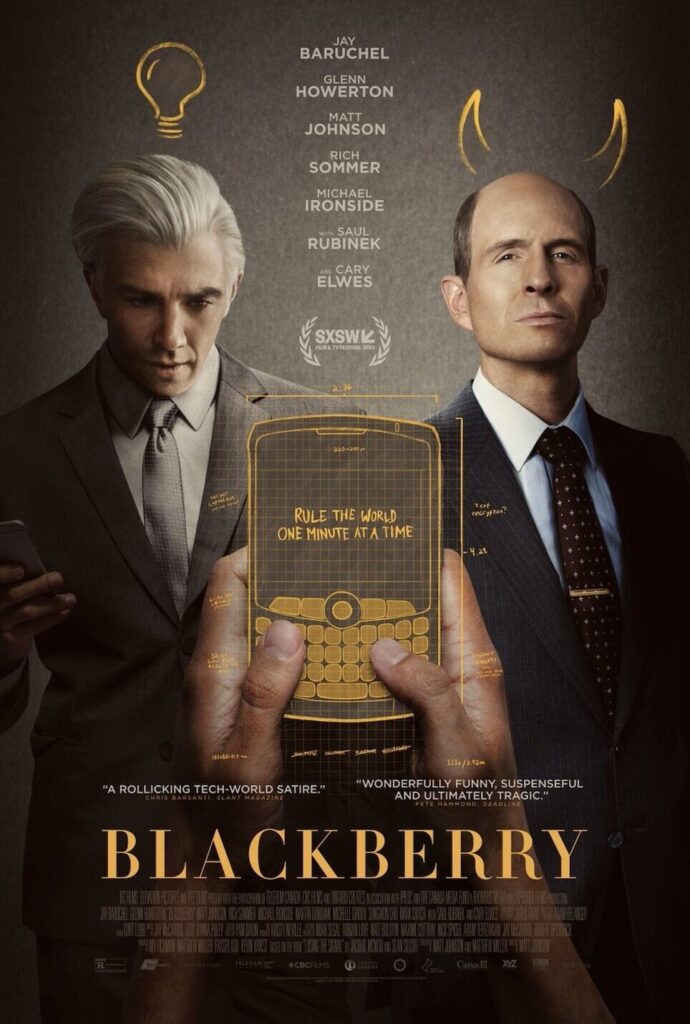
NUMBER 3 – BLACKBERRY
I don’t know what I was expecting with Blackberry but awesomeness was not on the list. Except that’s exactly what was served. Even if you liked nothing about this story, it’s impossible not to get caught up in Glen Howerton’s performance. I don’t know if the Academy has the balls to nominate him. He doesn’t fit what they’re looking for these days. But they should. And guess what? The story’s pretty good too. “Blackberry” is the tech industry remake of Titanic. We all know what happens to Blackberry. It hits an iceberg. So we have this dramatically ironic omniscient point-of-view which allows us to squirm in our seats as all the decisions are being made to position the company into being a global powerhouse. “Take Apple more seriously!” we scream. But they ignore us. Side note: If you can get your audience to yell at the screen, you’ve won. I love it when writers make cautionary tales fun. Cause most cautionary tales are just sad. This was fun because the supporting characters (especially Matt Johnson, who plays the co-founder) are so zany. And Howerton chews up so much scenery he gains ten pounds by the end of the film. Blackberry is like the cousin to Dumb Money. If you’re feeling down, throw these two in for a double-feature and I guarantee you’ll be smiling for the rest of the day.
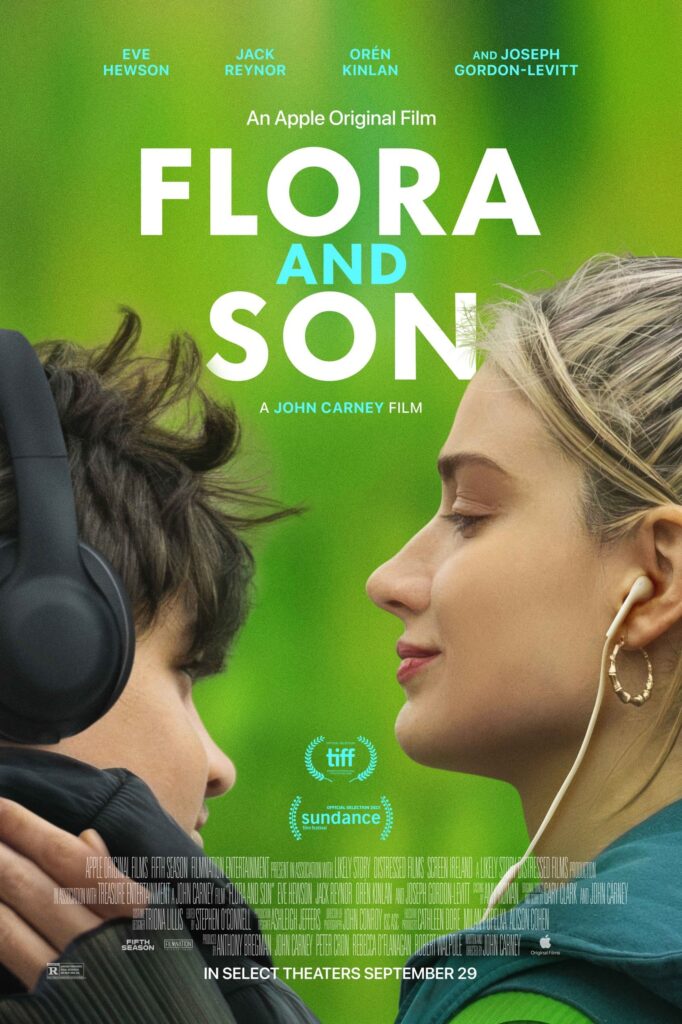
NUMBER 2 – FLORA AND SON
There isn’t a more feel-good movie this year than Flora and Son. John Carney is my new hero. He recognized that studios have spent the last five years making these divisive movies that piss half the audiences off. He realized that there was a market for making a movie for everyone. Flora and Son is about family. It’s about music. It’s about never giving up. It’s about trying new things. It’s about love. To be fair, a lot of movies try to be about these things. But what sets this film apart is Flora. Flora is a great character. Cause here’s the thing. When you make feel-good movies, the goal is not to make everything in the movie happy-happy. That’s not how you make people feel good. You have to show people the dark side in order for them to appreciate the light. There’s this early uncomfortable scene where Flora, who’s hired a hot online male guitarist from America to teach her guitar, listens to a song of his where he bares his soul. Afterwards, she asks him to sing it again, but this time with his shirt off. In other words, Flora is not perfect. She has some learning to do. But that’s what good movies are about. They’re about characters who learn. Who change. Watching Flora change into this better version of herself was the best character journey I watched all year. And, even if you don’t buy into any of that, it’s still a fun feel-good movie that’s perfect Christmas viewing.
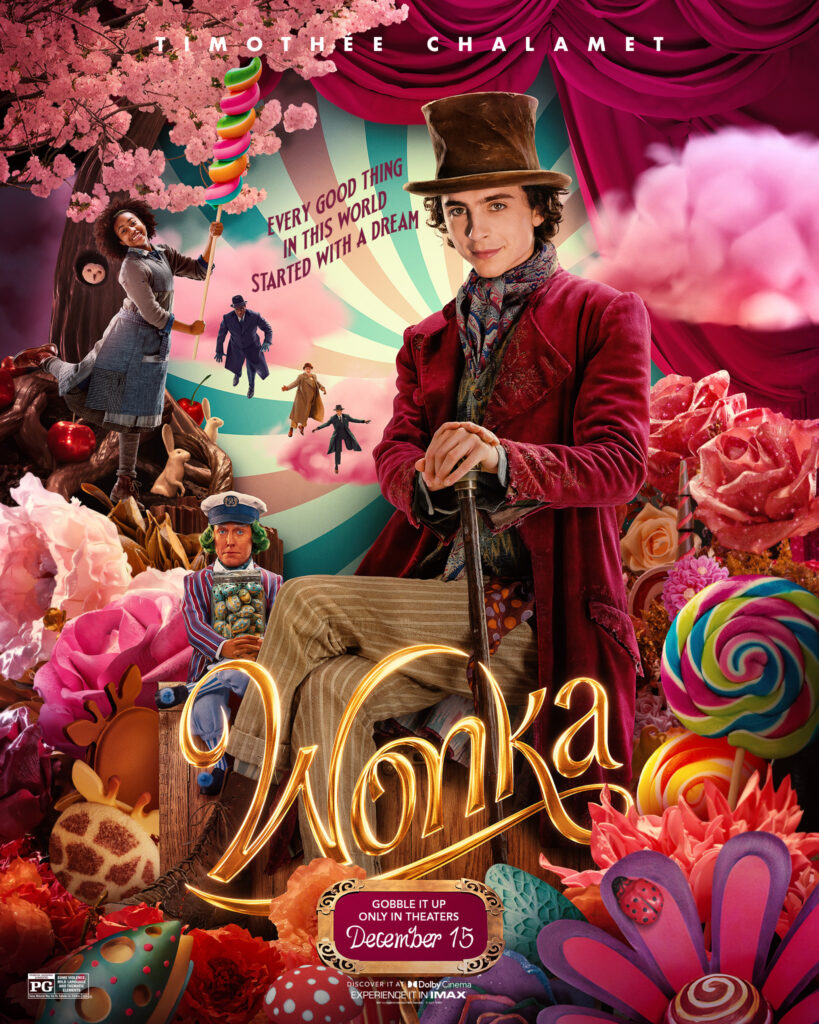
NUMBER 1A – WONKA
The reason this is 1a is because I didn’t see it until after I made this list and, therefore, had to fit it in. Because it’s THAT GOOD OF A MOVIE. I’m not saying this so I could look like the cool film Cinephile who likes films that are overlooked. This film blew me out of the water with how great the characters were, how simple the plot was, how elegantly that plot was executed. Here’s how good this film is. Timothee Chalamet, even though he’s got that one-in-a-million onscreen presence, isn’t over-the-moon good as Willy Wonka. And still the film is amazing. I can’t remember the last time I’ve watched a film where THIS MANY CHARACTERS popped. Every single character stands out. A lot of people will ask if it’s as good as the original. Probably not……… but it sure is close. Just because of the screenplay and characters alone. It’s that impressive.
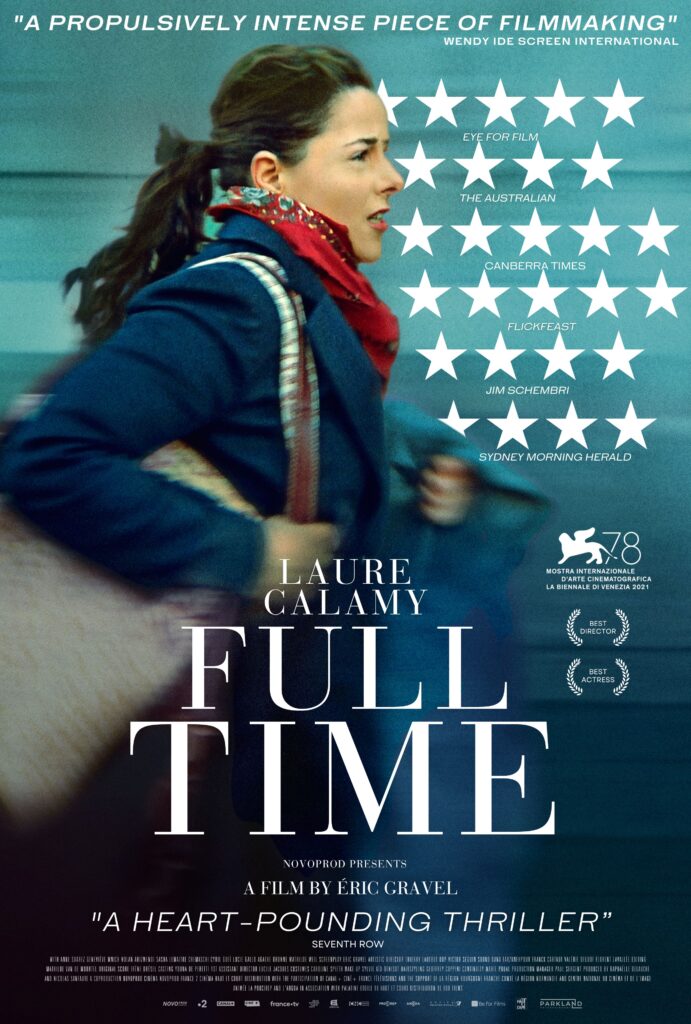
NUMBER 1 – FULL TIME
Full Time is an extremely simple movie. It’s about a mother who lives in the Paris suburbs who is hanging onto her hotel maid job in the city while raising two kids by herself. Then the train workers go on strike, preventing her from having an easy way into the city. Over the course of the next few days, this complication creates a chain of events that leaves her on the brink of losing everything. I’ve passively mentioned this movie a couple of times and a few of you pushed back, saying it was boring. I can’t imagine anyone thinking this movie was boring. You have all the Scriptshadow screenwriting staples in play. A main character we love because all she’s trying to do is support her family. She’s taken advantage of at work, which makes us like her even more. She tries to secure a better job, at the expense of losing this one. In other words, she’s an ACTIVE character. She’s not just passively waiting for the world to throw bad things at her. The stakes are enormous. She could lose her house if she gets fired. Her and her kids could be on the street. But the movie’s biggest advantage is its urgency. Every – Single – Day is a race. Cause she’s trying to get to work. If she’s not on time, she’ll get fired. So we always feel this desperation in the narrative. And that’s what I was most impressed by. It’s one thing to create tons of urgency in a movie about terrorists or superheroes or asteroids. For a writer to create this much urgency out of a woman just trying to get to work? That’s what blew me away. Not only creating that level of real-world urgency. But making us FEEL IT. The craziest thing is, I wouldn’t have even heard of this movie if my parents didn’t recommend it. I’m supposed to be on top of things. It just goes to show that there are gems out there. Which is why I now leave the voting in your hands. What gems did you find in 2023??


